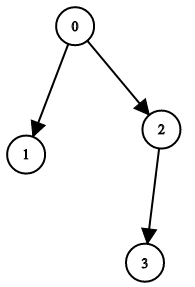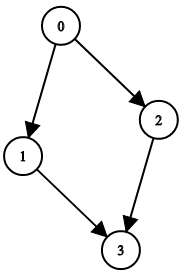Problem
You have n binary tree nodes numbered from 0 to n - 1 where node i has two children leftChild[i] and rightChild[i], return true if and only if all the given nodes form exactly one valid binary tree.
If node i has no left child then leftChild[i] will equal -1, similarly for the right child.
Note that the nodes have no values and that we only use the node numbers in this problem.
Example 1:

Input: n = 4, leftChild = [1,-1,3,-1], rightChild = [2,-1,-1,-1]
Output: true
Example 2:

Input: n = 4, leftChild = [1,-1,3,-1], rightChild = [2,3,-1,-1]
Output: false
Example 3:

Input: n = 2, leftChild = [1,0], rightChild = [-1,-1]
Output: false
Constraints:
n == leftChild.length == rightChild.length1 <= n <= 104-1 <= leftChild[i], rightChild[i] <= n - 1
Solution
/**
* @param {number} n
* @param {number[]} leftChild
* @param {number[]} rightChild
* @return {boolean}
*/
var validateBinaryTreeNodes = function(n, leftChild, rightChild) {
var indegree = Array(n).fill(0);
for (var i = 0; i < n; i++) {
leftChild[i] !== -1 && indegree[leftChild[i]]++;
rightChild[i] !== -1 && indegree[rightChild[i]]++;
}
var root = indegree.findIndex(num => num === 0);
var visited = Array(n).fill(false);
var visit = function(node) {
if (visited[node]) return false;
visited[node] = true;
return (leftChild[node] === -1 || visit(leftChild[node]))
&& (rightChild[node] === -1 || visit(rightChild[node]));
};
return visit(root) && visited.every(n => n);
};
Explain:
nope.
Complexity:
- Time complexity : O(n).
- Space complexity : O(n).